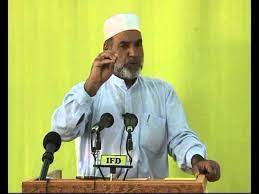Engineer Nazir Ahmad Pampori - As I Know Him
Zeeshan Rasool Khan
Years ago, Molana Mushtaq Ahmad Khan Sahb gifted me a book ’
Moie Muqaddas Ki Azmat ’ – the grandeur
of Prophet’s (Pbuh) sacred hair’ to read. The language, presentation, the art
of explaining intricate things lucidly, and frequent mention of Quranic verses
and Ahadith to authenticate every point impressed me profoundly. I became eager
to know more about its writer – Molana
Engineer Nazir Ahmad Pampori Sahb. On the next meet with Molana Mushtaq
Ahmad Khan Sahb, I managed to
ask him about Er Nazir Sahib. As I uttered Nazir Sahb’s name, Molana was all praises
for him. A few years later, when Molana Mushtaq Sahb fell ill, I had the
privilege to meet Er. Nazir Sahib at former’s home. However, the meeting was
confined just to greetings. Months after that, on
instructions of Molana Mushtaq Ahmad Khan, a seminar ‘Niyamat’e Uzma (Pbuh) Conference’ was organized
in Kulgam and Er. Nazir Sahib graced the event with his presence as a guest
speaker. That time I not only listened to his pithy, intellectual, philosophical,
and love-filled speech but also got the opportunity to travel in his van from
Kulgam to Khanbal. Being an ordinary person, I did not dare to talk to him
directly. In fact, a scholar Molana Shabir Ahmad Wani Sahib, whom I was
accompanying, talked to him on various religious issues and the conversation
between the two was enough for me to understand the greatness of Pampore’s
great personality. His matchless simplicity, overall personality, eloquence, and
knowledge left me awestruck.
I found him congenial. He openly
shared his thoughts and even some personal information. He apprised us about
his efforts towards the promotion of Ahle-Sunnat. That was the day when I learned
about the author whose writing had fascinated me and luckily, became
familiarized with many of his other remarkable attributes.
Nazir Ahmad Mir was born in a well-off family in Pampore of
district Pulwama on 26 March 1962. He had his schooling at Government High
School Pampore. After graduating from S.P College Srinagar, he obtained an
engineering degree from Polytechnic College Srinagar. In 1989, he joined the irrigation
and flood control department as Junior Engineer, but his repute was the turnout
of his enormous contribution to religion; Islam. His association with scholars
like Allama Syed Muhammad Ashraf Andrabi
Sahb and his deep interest in religious affairs did not allow him to serve
as an officer only but incited him to read, research, write, and deliver Islamic lectures. Thus, Er
Nazir Sahib earned a reputation as Molana
Er. Mir Nazir Ahmad Pampori. Gradually, Er. Nazir Sahib rose to prominence
and attained the status of the bright star of Ahle-Sunnat who
illuminated thousands of hearts and minds through his articulacy and purposeful writings. He had a
unique ability to present complex concepts in a graspable way with both tongue
and pen. Writing and speaking in the light of the Quran, Hadith, and other
authentic sources made him influential. That is why, even without having any
degree in Islamic Sciences, he was considered as a credible scholar and was well-regarded by people of
almost every sect, and consequently, he was quite successful in motivating and
attracting an audience, particularly youth.
He was moderate in his approach and always strived to unite
Muslims. Unlike other preachers, he would not believe in needless criticism but
always focused on his mission, which was to teach and inspire the people to
understand the universal message of Islam and live life accordingly. This aura
existed/exists in his preaching and writings as well.
Despite being an officer and a great scholar, he was down to
earth. Most of the time, he would dress plainly contrasting to other religious
orators. He would mostly appear on pulpits in traditional attire – ordinary skullcap,
shalwar-kameez, and rarely with a waistcoat.
His simplistic dress sense will also be remembered for long let alone his
scholarship. His mode of expression was so simple that the people – literate
and illiterate would understand him equally.
He was founding member and key leader of Shah-i-Hamdan (R.a)
Memorial Trust – established by Allama Syed Muhammad Ashraf Andrabi (R.a) and until
last played a significant part in its maintenance and functioning. It is said
that once Trust faced financial crises and feeding the students became
challenging, but Er Nazir Sahb arranged money from his own pocket.
He used to treat all other seminaries and Sunni organizations
like his own and enthusiastically supported them. Pakistan- based religious
organization Dawat Islami succeeded in spreading its roots in Kashmir owing to the abetment of great men like him.
He along with other leaders of Shah-i-Hamdan Trust was also involved in
popularizing Shaykhul Islam Dr. Tahir ul Qadri’s literature and in launching of Minhaj-ul-Quran in Kashmir. He was selfless and not self-centered. Connecting people with the soul of the
Islamic faith i.e, Prophet Muhammad (pbuh) was his primary objective and
it hardly mattered to him which organization or seminary would serve as an agency
to ensure it. He contributed to exploring all possibilities to achieve this
goal rather than calling his Institution as the only medium, as is done by
other existing clerics.
Er Nazir Sahb wrote about 70 books on various subjects. Most
of them have been published. And ‘Tareekh’e Parganah’ (historical account of
Pampore), based on thousand pages deserves to be called his magnum opus. He was
a poet as well but employed his skill mainly to glorify Prophet Muhammad (pbuh)
and other religious dignitaries. He has to his credit several Naats, which were
well-received by the public and are recited everywhere in the valley.
On 18 February 2022, we lost him and truly suffered a great
loss. May Allah shower blessings upon his grave ceaselessly. Aameen.
Writer : Zeeshan
Rasool Khan is student and tutor and can be mailed at mohdzeeshan605@gmail.com

.jpg)

Comments
Post a Comment